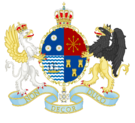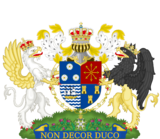Aquitaynian Foreign Policy
This article is incomplete because it is pending further input from participants, or it is a work-in-progress by one author. Please comment on this article's talk page to share your input, comments and questions. Note: To contribute to this article, you may need to seek help from the author(s) of this page. |
| This article is part of a series on |
| Politics of Aquitayne |
|---|
 |
The foreign policy of the Constitutional Monarchy of Aquitayne is carried out by order of the crown, parliament, and the Royal Foreign Policy Advisory. Even though the crown traditionally has the ability to engage the international community in diplomatic talks, this role has - in the modern era - been subdued to the initial introduction of diplomatic channels. It is the vote of parliament via a 2/3rds majority and the acceptance of the Royal Foreign Policy Advisory that any foreign policy change can be put into legal effect. Even then, traditionally, a one-week grace period is granted before the document is considered to be binding.
It is the role of the Royal Foreign Policy Advisory to assign diplomats to embassy's around the world, and it is also their responsibility to advise the King on matters regarding foreign policy. According to court custom, the only member of the Royal Foreign Policy Advisory who may interrupt a speaker is the King himself, and even then only in matters of great urgency.
It is the official policy of the Constitutional Monarchy of Aquitayne to expand the economic prowess of Aquitaynian business and enterprise abroad, and to protect the peace and welfare of the nations and people of Astyria, as per the Reich Credenda.
Foreign Policy Aims
Multilateral Relations
The Constitutional Monarchy of Aquitayne is currently a member of multiple multilateral organisations across Astyria and the rest of the world. The monarchy has been eager to incorporate itself in meaningful dialogue internationally on a wide variety of issues, including economic hardships, third world development, and monetary support for struggling nations. The most notable multilateral organisation the monarchy has become a member to is the E10 Council of Nations, which takes positions on a wide variety of issues ranging across the entirety of Astyria.
Below is a list of the multilateral organisations Aquitayne currently belongs to:
| Logo | Organisation Name | Aquitaynian envoy | Member States | Current Role | Monetary Support |
|---|---|---|---|---|---|
| None | Tel Al-Riyah Pact | Samuel Reich | File:Symphonia.png Symphonia |
Aquitayne plays a large and influential role in the Tel Al-Riyah Pact, as the leading nation in the group's effort to maintain neutrality across Astyria. | |

|
E10 Council of Nations | Kar'Hak Agathor | The current role of the Constitutional Monarchy of Aquitayne in the E10 Council of Nations is a strong one. It currently holds vast political power within the organisation, and as both member-states of the United Kingdom are present, it is expected that any vote which has the support or disapproval of either the Symphonian or Aquitaynian delegation will have at minimum ±2 votes. Currently, Aquitayne holds sufficient sway in the council to help determine the success or failure of meaningful legislation. | N/A | |
| File:IIPMO.jpg | International Ice Patrolling and Monitoring Organisation | Timothy Holden | File:GrandFlag.png Kington Langley Independent Gredavcat Teddy Bear Republic The Socialist Federation of Barunia |
The Constitutional Monarchy of Aquitayne currently has a Boardmember on the Board of Governors of the organisation, though that is not to say it has any real power in meaningful legislation that comes out of the body. Rather, the monarchy holds an equal and uninhibited position which allows it to effect legislation, but prevents it from allowing or denying such legislation. | None |
| File:OECD.png | Organisation for Economic Co-operation and Development | Arthur Pollard II | Mizialand Ha Duvénasíma Sayónæ ve Everayím Egyptos New Edom Super Bwitain Regnum Albion File:RombergianArctic.png Romberg Liberated Counties Ontorisa |
As the Constitutional Monarchy of Aquitayne holds an Electoral Council Member position within the OECD, it has certain privileges and rights that other member-states do not. That being said, while it has more political power and the ability to veto bills, that is not to say it has total control over the organisation. To the contrary, the OECD has enough members that any attempt of Aquitaynian interference in the voting process would largely be mute. | None |
| File:Fellowship of Imperial Realms Flag (2).PNG | Fellowship of Imperial Realms | Twheir Wun | Machina Haruspex Mahdah Renor Xukuth Tagmatium Takhsis Scandinvans |
Currently, the Constitutional Monarchy sits on the Council of the Fellowship of Imperial Nations, as the body's treasurer. As such, it handles all donations and stipends given by the various member-states, and wields the authority to approve or reject funding for any Fellowship installation. That said, Aquitayne, for being by far the smallest member state, wields extreme levels of power in the legislative and political processes that the Fellowship undergo. | None |
Alliances
United Kingdom
The Constitutional Monarchy of Aquitayne is the sister state of the Empire of Symphonia, the second and only member of the United Kingdom. The United Kingdom is one of the most prominent entities in central-eastern Astyria, and often opposes the Eastern Astyrian Trade Organisation in foreign policy aims and actions across the Mare Ferum and especially Insula Fera.
Bilateral Relations
The Constitutional Monarchy of Aquitayne currently holds bilateral relations with numerous countries around the world.
Blackhelm Confederacy
The bilateral relationship between Aquitayne and the Blackhelm Confederacy began roughly in 1650. The then Empire of Exponent interfered in the affairs of the nation of Aquitayne, bringing that nation unders its banner in 1653. After setting up their trading post on the island of Castineos during the later half of the previous century, the empire had enjoyed significant economic power in the area, power which it had hoped to convert into political strength. During the mid-1600's, it became apparent that there were several powerful factions vying for the Aquitainian throne. After some study, the empire decided to throw its support behind House Kon'rei, believing that with the support of Imperial arms and money they would sweep out the existing monarchy, which they did successfully. Following the decrowning of the ruling family and installation of House Kon'rei upon the Aquitainian throne, the Empire established itself as de facto rulers over the area, allowing the Kon'reis to rule on as a kind of governor, overseen by a viceroy from Hesperidisia.
The most important drive behind the conquest of Aquitayne was the rapidly declining population on Hesperidisia and the resulting food shortages, as disease wiped out farmers in droves. Aquitayne, viewed by the Imperial government as a prime location far away from the Hesperidisian homeland and thus untouched by the diseases ravaging it, was set out to become the bread basket of a revitalized empire. Immediately upon establishing their command in the area, a grand land redistribution was laid out, maximizing the agricultural output of the area. It was hoped that with this new source of food, the Empire would be given a new life, and once again be able to rise to the power and prominence it enjoyed in the previous two centuries.
This history is largely believed to be the root of the current divide in Aquitaynian-Confederate relations. Due to the recent events in Insula Fera, Aquitaynian-Confederate relations have dropped to an all-time low, especially given the level of distrust between the two states and their history. With the Confederacy being the leader of the Eastern Astyrian Trade Organisation, an even further level of distrust and distaste is seen between the Monarchy and the Confederacy. Even though both nations have signed the Karlot Espuceil, a document which prevents either nation to undermine the political authority of the other, it is widely known that both mostly ignore this mutual agreement.
Analysts agree it is unforeseeable the bilateral relationship between the Blackhelm Confederacy and Aquitayne will shift any time soon.
Dangish Empire
The current bilateral relationship between Aquitayne and the Dangish Empire is increasingly complex and difficult to understand. Traditionally, the two monarchies enjoyed the trade and company of one another, but due to a recent diplomatic impasse over the Humanitarian Intervention in Pangus in Insula Fera, where the Eastern Astyrian Trade Organisation has implemented no fly zones and inserted observers to the process of self-determination over the sovereign states of Pangus and Prudenesia, relations have broken down to a low not seen in decades.
The Dangish Empire, following their Osbourne Doctrine, issued an ultimatum to United Kingdom forces which had begun operations in Insula Fera that if they did not withdrawal a state of war would exist between the two nations. Eventually the ultimatum was amended and the current agreement of Dangish military resources to the region, including an aircraft carrier and three battleships, was agreed on. However, the monarchy of Aquitayne reportedly made it explicitly clear that the Dangish were not welcome and were essentially interfering in domestic affairs. While the validity of that and the response of the Dangish monarch cannot be ascertained completely, the situation has brought both the United Kingdom and the Eastern Astyrian Trade Organisation to the brink of open war.
The impasse is also believed to have lead to the Tel al-Riyah Pact between Aquitayne, the Fascistic Republic of Riysa and the Protectorate of Cadenza, where one of the main and most important clauses is a unilateral agreement that both states will immediately, "stop all active pursuance of membership to either body [EATA/ATO] indefinitely". This is, aside from the Reich Cadenda, the first open application of Aquitayne's traditional policy of open neutrality between the Eastern Astyrian Trade Organisation - of which the Dangish Empire is a member - and the Astyrian Trade Organisation.
Symphonia
Aquitaynian foreign policy affirms that the alliance with Symphonia as the most important bilateral relationship in the world, evidenced by aligned political affairs between Telora and West Genevira, as well as the conduct of joint military operations between the two nations. While both the Monarchy and the Asian Federation maintain close relationships with many other nations around the world, the level of cooperation in military planning, execution of military operations, nuclear weapons technology, and intelligence sharing with each other has been described as "unparalleled" among major powers throughout the 20th and early 21st century.
The union of the two states to the United Kingdom is, perhaps, the greatest show of this relationship.
Nikolia
The bilateral relations between Aquitayne and Nikolia are strong. The two nations are monarchies and actively seek to protect one another in times of need. In 2012, Victoria Reich was married to Crown Prince Konstantin Petrov-Stefanović, uniting the two nations through royal marriage for the first time in the 21st century. The nations trade often, with Aquitayne importing agricultural products and wheat, while exporting hard stones like granite and limestone back to Nikolia. Nikolia is also an arms producer for Aquitayne, with the Ministry of Defense reporting an import of roughly 20 Nikolian aircraft in 2015. His Majesty the King Samuel Reich and the Crown Prince are known to be extremely friendly, which analysts believe shows strong signs of future agreements once the Crown Prince takes the throne.
Falkasia
Aquitayne shares a unique and complex bilateral relationship with Falkasia. Although there have been conflicts in the past between the two states, current relations are good. Although there are currently no outstanding treaties on the import and export of goods between the nations, both states rely on the transport of trade up and down the eastern coast of the continent for much of the toll tax and international travel between them.
Ghawkins
The bilateral relationship between Aquitayne and Ghawkins are good. While Ghawkins approached the monarchy about entering the Astyrian Trade Organisation, as per the Reich Credenda, Aquitayne denied. However, strong economic ties still take place between the two nations, with Aquitayne importing large amounts of phones, computer chips and other technological devices.
Haguenau
The bilateral relations between Aquitayne and Haguenau are just beginning to take shape. In a summit between His Majesty Samuel Riech and His Majesty Étienne II, the first steps of diplomatic channels were opened between the two monarchies. This is seen widely as an extension of Aquitayne's policy of protecting their monarchical allies across the region from what is perceived as the threat of "Roman romanticism", i.e Democratic governments. Likewise, it is seen by some as a way to restrict the growth of the EATA and ATO from admitting another sovereign state entirely, but also - and perhaps more importantly to Aquitayne- that of a monarchy.
Neu Engollon
The bilateral relationship between Aquitayne and the Confederacy of Neu Engollon are rather neutral. While the two nations engage in private commercial trade, mostly in the alcohol industry, the two government's have not signed any formal trade agreements nor pacts for mutual defense. As the Confederacy is not a member state of the Astyrian Trade Organisation, the monarchy has been has been actively attempting to increase the volume of trade via trade negotiations as well as the level of cooperation between the Aquitaynian and Neu Engollian intelligence services. Likewise, the political alignment of the Confederacy and Aquitayne are largely on par with one another, and for the large part both governments largely get along well with one another.
Riysa
The bilateral relations between Aquitayne and Riysa are extremely good. The recent signing of the Tel al-Riyah Pact, alongside the signatory state of Cadenza, is a strong sign that relations between the two nations are at an all-time high. This is highlighted by the deployment of Riysian soldiers to the United Kingdom Humanitarian Intervention in Pangus, which has been the cause of a diplomatic impasse between the United Kingdom, the Dangish Empire and the Blackhelm Confederacy.
Currently, as per the Tel al-Riyah Pact, a free trade agreement currently exists between the two sovereign nations, as well as a full extradition treaty. This is seen as a milestone in not only Vik-Arab relations but also as a great step of Aquitaynian power projection to the southern regions of Astyria, alongside its current negotiations with the Seraphic Empire.
Riysa currently imports large amounts of agricultural goods from Aquitayne, including wheat, salt, and manufactured agricultural goods. In turn, Aquitayne imports large amounts of raw minerals from Riysa, which account for roughly 15% of chemical manufacture within the monarchy.
Romberg
The bilateral relations between the monarchy and Romberg are extremely good. The two states are members of the International Coalition for Expansion, an alliance of democracies committed to forcibly opposing tyranny and dictatorships. They are also both members of the monarchist alliance of Astyria. The two nations operate in terms of geopolitical cooperation, especially with ongoing actions to unite the aristocracy of Astyria.
Seraphic Empire
The bilateral relationship between Aquitayne and the Seraphic Empire are excellent. The formerly isolationist empire has proven to be a reliable ally towards the Aquitaynian crown, and one of the most important summits of recent Astyrian memory have taken place in the Seraphic Empire, which concluded with the culmination of many monarchs around the region, including Romberg, signing a mutual defense and free trade agreement. The royalty of the Seraphic Empire, while in the past being fractal in nature, has proven to be a unifying force when it comes to supporting the Aquitaynian crown.
Though the political alignment between Telora and Senneterre can be differential at times, the two governments often meet at middle-grounds and cooperate fully to better serve both their interests in preserving the monarchies of Astyria and likewise their own self-determination as sovereign states.
Terre des Gaulles
While the monarchy of Aquitayne traditionally holds strong support for other monarchist states around the region, published intelligence reports suggest Terre des Gaulles was implicated in the fall of the Imperial Spartanian empire. This was done by using the nation as part of the supply chain that helped the Herald terrorist organization in overthrowing the government. The monarchy has not fully decided on a course of action regarding this information, however given the proximity of the incidents on Insula Fera, future action may be decided upon.
Yellow Star Republic
Currently, the bilateral relationship between Aquitayne and the Yellow Star Republic is a complicated one. Due to the current conflict over Plätteisen Adler, Aquitayne has resigned to remaining neutral in the conflict in an effort to not polarize themselves between the Eastern Astyrian Trade Organisation and the Astyrian Trade Organisation. Likewise, the monarchy does not fully support the largely socialist ideology of the Republic, and has in the past called for its dissolution, as the monarchy does not see the benefit of a socialist state.
ViZion
The bilateral relationship between Aquitayne and ViZion is of notable importance to both countries. While in the past there have been calls for anti-trust laws to be enacted against ViZion's megaconglomerates, this has not widely effected the trade and economic relationship between the neighbors. While the ViZionese economy is the largest in Asyria, the only significant industries of trade between Aquitayne and ViZion are in the telecommunications industry and the financial sector. There is no current military, defense or trade agreement existing between the two nations, even though both rely heavily on one another's commerce.
